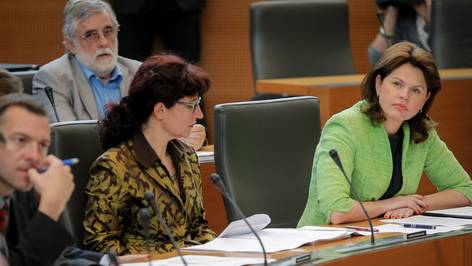NEWS
Prime Minister Alenka Bratušek at the National Assembly: "Slovenia's recent borrowing was on much more favourable terms and less expensive than the borrowing under the previous Government"
The Prime Minister of the Republic of Slovenia, Alenka Bratušek, today attended the 14th regular session of the National Assembly, at which she answered questions from the deputies. Regarding the sale of government bonds, Deputy Jožef Horvat from the New Slovenia Deputy Group asked the Prime Minister about the annual costs incurred by Slovenia to service the last sale of bonds and about its specific purpose. The Prime Minister explained that the last borrowing was not as unsuccessful as the second last arranged by the previous Government, which was taken out on significantly less favourable terms and was more expensive for Slovenia, given that the issue of a 10-year dollar bond in May this year was 10 basis points more favourable than the issue of a 10-year dollar bond in October last year, expressed in euros. Moreover, the Republic of Slovenia decided in favour of the synthetic borrowing so that euro cash flows are evident and Slovenia is not exposed to exchange rate changes. "The situation in the market at the beginning of May 2013 was very encouraging and, despite the fact that the dollar-borrowing was more expensive than in October 2012, the euro-borrowing costs were lower," the Prime Minister stressed. As regards the purpose, the Prime Minister said that the funds acquired are used for the financing of national budget implementation and the national debt management in a fiscal year, while a part of these funds will be earmarked for the recapitalisation of Slovenian banks.
Deputy Jože Tanko from the Social Democratic Party Deputy Group raised the question concerning the sale of state assets and inquired about the criteria on which the Government made a decision to sell Nova KBM bank of all banks. The Prime Minister replied that insufficient capital adequacy and a high share of non-profitable loans are a great burden on the banking system, increasing the credit risks of banks and reducing the banks’ ability to take up loans on international financial markets. In this context, she also pointed to basic criteria on which the list of state-owned assets intended for sale was made. "Even if Nova KBM bank is a system-relevant bank, the Government decided to sell it with a view to increasing the stability of the banking system. The bank will need an additional capital boost given that potential investors will make their entry into the bank capital conditional on a total control of and supervision over the management of the bank," the Prime Minister said, pointing out that the foreign ownership entry into banks will not diminish but reinforce the supervision, which means that the argument about her membership in the Nova KBM supervisory board being associated with the sale is in no case true. She also drew attention to the fact that during her supervisory board membership she personally had never experienced any interventions concerning the loans nor had she intervened in connection with granting any loans.
Deputy Franc Pukšič from the Slovenian People’s Party Deputy Group asked the Prime Minister about concrete measures the Government will take to revive economic growth and about the estimated effects of the measures on economic growth and employment in the current and next years. In her reply, the Prime Minister said that the overhaul of the banking system was crucial for the Slovenian economy and the creation of new jobs. "Within the existing long-term and specific credit lines of SID bank, additional EUR 400 million of long-term resources will be provided in 2013; on the basis of these and new resources, up to thousand enterprises will be supported annually," the Prime Minister replied, adding that additional EUR 140 million will be available for enterprises in 2013 to shore up about thirty corporate projects. She also explained that while drawing up the measures they were continuously in touch with the Slovenian chamber of commerce and industry and the chamber of craft, whereas the function of the consultative body is to be entrusted with the newly established development council.
Deputy Rihard Braniselj from the Civil List Deputy Group had a question concerning the overhaul of the banking system and the transfer of bad debts. The Prime Minister stressed that this measure should apply to all members of the management and supervisory boards since "those who have committed criminal offences must be held accountable. The worst loans which we are now dealing with were granted by all or at least by two major state-run banks in the period from 2006 to 2008". According to the Prime Minister, reducing the share of non-performing assets in banks and ensuring capital adequacy are key measures to strengthen the stability of banks and, consequently, improve financing conditions. With the aim of implementing these measures, the Bank Assets Management Company (the BAMC) has already been established; the BAMC is in place and operational under the Measures of the Republic of Slovenia to Strengthen the Stability of Banks Act. Parallel to the transfer procedure of non-performing assets from banks to the BAMC, the state is to recapitalise banks if no private investor can be attracted, said the Prime Minister. "On the basis of a review of bank assets and implemented stress tests by the Bank of Slovenia, an estimated EUR 900 million will be required to recapitalise banks," she explained, adding that the Government of the Republic of Slovenia was to adopt a formal decision on the appropriateness of the bank regarding the implementation of the measures aimed at strengthening the stability of banks, which the Government has already done with respect to the first bank. And on the basis of a review of bank assets and implemented stress tests by the Bank of Slovenia, a total of EUR 3.3 billion of bad loans are to be transferred to the BAMC.




